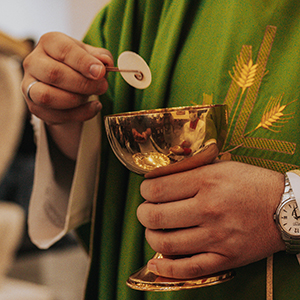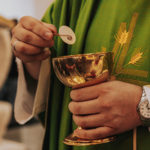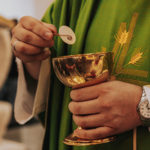Mass Readings Audio
https://bible.usccb.org/podcasts/audio/2021-08-01-usccb-daily-mass-readings
Eighteenth Sunday in Ordinary Time – August 1, 2021
Welcome to the one hundred and seventy-fifth episode of By Your Life. I’m Lisa Huetteman and I know that you have a hundred different things you could be doing right now, so I thank you for choosing By Your Life.
My goal is to inspire, empower, support, challenge, and encourage you to connect Sunday, with Monday-Friday, in a secular business world. It’s my desire to help you live our Catholic faith in the marketplace. I hope to offer you practical ways to go forth and glorify the Lord by your life.
In this edition, we’ll reflect on the readings for the Eighteenth Sunday in Ordinary Time. (Year B) Three years ago in episode 019 of By Your Life, when reflecting on the readings for this Sunday, I talked about why your beliefs matter. This week after the astonishing announcement by Olympic gymnast Simone Biles that she was withdrawing from the competition, we recognize the truth that a lack of belief also matters.
Biles told reporters after the gymnastic team finals that “You have to be there 100 percent. If not, you get hurt.” She said she had never felt like that going into a competition and she tried to go out and just have fun. But when she went out she said, “No. The mental is not there.” So, she chose to withdraw. I respect her for her decision because as Henry Ford said, “Whether you think you can or whether you think you can’t, you’re right.”
If You Lack Belief, It Matters
If you lack belief, it matters. If you don’t believe in yourself, you won’t pursue your dream. If you don’t believe in a cause, you won’t do anything to further it. If you don’t believe in your company’s product or service, you won’t put your best effort into promoting it.
The Great Resignation
This spring, people quit their jobs at the highest rate since the government began tracking turnover numbers. A record 4 million people quit their jobs in April alone, according to the Labor Department. That was 2.8% of total employment. That number was down to 3.6 million in May, but still a significant 2.5% of the total number of workers. Experts explain that there are a variety of reasons for the mass exodus, including pay, working conditions, and culture.
According to Alison Omens, chief strategy officer of the research firm JUST Capital, although financial incentives are a part of the equation, the major shift in priorities means it’s not just about the money. Many retail and service workers are departing in favor of entry-level positions elsewhere – in warehouses or offices – that actually pay less, but offer more benefits, upward mobility, and compassion. She said, “We ask people would they take a pay cut to work for a company that aligns with their values, and across the board, people say yes.”
Not Working for Food that Perishes
Gandhi said, “To believe in something, and not to live it, is dishonest.” If you are working for a company whose values don’t align with your values, you’re being dishonest. In Jesus’ terms, from our Gospel, you’re working “for food that perishes.” (Jn 6:27)
But many people hadn’t given much thought to what they valued until the pandemic. In a story on NPR, Harvard Business School professor Tsedal Neeley said, “We have changed. Work has changed. The way we think about time and space has changed,” Workers now crave the flexibility given to them in the pandemic which had previously been unattainable. Some have a renewed desire to make family a priority. People no longer believe that work is just about paying the bills. Life’s too short to work in a dead-end job, for someone who doesn’t care about you, or for a business without a purpose. They are calling it “The Great Resignation,” and in record numbers, workers are moving on.
Believing in Employee Well-Being
But not all. According to an article in Forbes, “the pandemic was a kind of litmus test during which companies revealed their true natures. Companies genuinely committed to their employees’ well-being stepped up their efforts and dug deep, while companies with a toxic culture became even harder to work for.”
Employees who work for companies that genuinely care about their well-being are extremely loyal. These companies are holding on to their people and they are growing their reputation as great places to work. During the pandemic, the companies on Fortune Magazine’s list of 100 Best Companies to Work For went out of their way to demonstrate concern for the whole employee, not just the on-the-job employee. They recognize that employee well-being and the quality of work are inextricably linked. So, when things got tough, they increased their commitment, not only to their employees, but to their communities as well. Their behaviors followed their beliefs.
Our Behaviors Follow Our Beliefs
Our behaviors follow our beliefs. I think this is why in the Gospel reading when the people asked, “What can we do to accomplish the works of God?” Jesus answered and said to them, “This is the work of God, that you believe in the one he sent.” (Jn 6:28-29) Believe in the one he sent. They asked what they could do, and his response was “believe.” Jesus is telling us that we will not do if we do not believe.
What do you believe? Perhaps a more important question is “who do you believe?” What we believe is highly influenced by who we believe. The sad truth is that most Catholics don’t believe the Church, the Body of Christ. In fact, most Catholics don’t believe the central teaching of the Catholic faith, that during the Mass, ordinary bread and wine become the Body and Blood of Jesus Christ.
Do you believe this? Do you believe Jesus is present in the Eucharist? If Catholics are honest, almost every one of us has had doubts about this Truth. We know that many Catholics have more than a doubt, they just don’t believe it. Ex-Catholics would not be the second-largest religion if all Catholics believed in the real presence in the Eucharist.
But ex-Catholics are only a part of the problem of lack of belief. According to a Pew Research Center survey, nearly seven-in-ten self-identified Catholics (69%) say they personally believe that the bread and wine used in Communion “are symbols of the body and blood of Jesus Christ.” Less than one-third of U.S. Catholics (31%) say they believe that “during Catholic Mass, the bread and wine actually become the Body and Blood of Jesus.”
Lack Mass Attendance Follows Lack of Belief
With this lack of belief, it’s no wonder that Catholics are not flocking back into the pews after their bishops lifted the dispensation granted during the height of the pandemic. The “Sunday obligation” is no longer a reason for Catholics to show up to Mass. Catholics are quitting their Church like workers are quitting their jobs. The sad thing is, unlike workers who are seeking something better for themselves and their families, Mass-quitters are missing out on the best thing they could ever have—the gift that Jesus gave us of himself in the Eucharist. But that’s not what they believe. Our behaviors follow our beliefs, and a lack of Mass attendance follows a lack of belief.
Broken Habits, Faded Beliefs
Three years ago, I ran into an old friend at the store. We knew each other from church, and she mentioned that she’d been bad about attending Mass on Sundays. In an expression of self-imposed guilt, she made some excuse about working nights and said she knew she should get back into regular attendance. After that meeting, I began to see her at Mass again.
And that’s what happened to my friend. I saw her out and about again after our churches re-opened and she asked me if I was going to Mass. I said that I was…every day. She told me that during the pandemic she had gotten out of the habit, but again she was thinking about going back.
Tamra Hull Fromm, the director of discipleship and an instructor at the Catholic Biblical School of Michigan, told Detroit Catholic, “When it comes to Mass attendance, we need to ask where people were in terms of their understanding of the sacraments before the pandemic. Do they have an understanding of how the sacraments nourish the faith and, therefore, are part of the routine of nurturing that faith? If they don’t understand the Eucharist, why would they come back?”
It’s Not Just the Virus
The ”Great Resignation” of church-going Catholics should be a concern for all of us. Jesus said, “Do not work for food that perishes but for the food that endures for eternal life, which the Son of Man will give you.” (Jn 6:27) Although the pandemic has helped many workers realize that there are more important things than just working for a paycheck—for food that perishes, it has not cured Catholics’ lack of belief in the importance of the food that endures for eternal life.
I know that the delta variant has caused new concern for the
- 175 Your Lack of Belief Matters
spread of Covid-19 even among vaccinated persons. There are also some who have serious health concerns and must stay away. But as my neighbor said, “If we can go out to eat, back to the office, and to our kid’s baseball games, I think we can go back to Mass.” And then she added, “but we’ve gotten used to the livestream on Sunday mornings in our pajamas.”
And that’s my point. According to NCR online, a September 2020 study from the Center for Applied Research in the Apostolate found that over a third (36%) of Catholics ages 18-35 said they planned to attend Mass less frequently when stay-at-home orders were lifted. This study was conducted before vaccines and variants affected people’s health and safety concerns. It indicates a lack of belief in the Real Presence of Christ in the Eucharist.
Reversing the Great Resignation
Staying away from the Mass during this pandemic has caused Catholics to become disconnected from one another. But the Mass is not just vertical with God feeding our hunger, it’s also horizontal where we nourish one another as a community of faith. If we believe in the Body of Christ, we should be as concerned as CEOs are about the Great Resignation of employees from their companies and step up our efforts to bring people back to Mass.
This pandemic has given us time to gain clarity of our values. If we value the Body of Christ, the more important part is to walk the talk. It is time, as St. Paul wrote in our second reading, to “put away the old self of your former way of life,” (Eph 4:22) and to “be renewed in the spirit of your minds, and put on the new self, created in God’s way in righteousness and holiness of truth.” (Eph 4:23) St. Paul encouraged the Ephesians to “no longer live as the Gentiles do, in the futility of their minds; darkened in understanding, alienated from the life of God because of their ignorance…” (Eph 4:17-18) We too must encourage our fellow Catholics to come back to the life of God.
So, when the time is right, invite someone you know who has been away to come back on Sunday and remind them of what they have been missing: in the words of Moses to the Israelites from our first reading, “the bread that the LORD has given you to eat.” (Ex 16:15) Or as Jesus said, “The bread of God… which comes down from heaven and gives life to the world.” (Jn 6:33) The food that endures for eternal life. (Jn 6:27)
Let’s pray for God to help us.
Heavenly Father, these have been trying times as we’ve been forced to work and worship remotely. But we know that you have heard our grumbling and use all things for good. We ask your protection from this virus, health for those who are sick, comfort for those who fear, and consolation for those who have lost loved ones. Most importantly, Lord God, we do believe in the One you sent, help us to be a witness to a world that lacks belief. Help us to accomplish your works and be created in your way of righteousness and holiness of truth, so in all that we do, we may glorify you by our lives.
May God bless you abundantly and may you glorify the Lord by your life.
If you liked this episode, spread the word. You know what to do, forward, share, or click to post. Also, check out the Resources page where you can find a link to the books and other resources mentioned in other episodes of By Your Life. I’m always interested in what you think, so give me some feedback by leaving a comment.










Thanks be to God and to you, Lisa, for another great episode — one of your best! You — and God and our Church, with this Sundays Readings — are very timely and insightful!
Thanks Joel for the affirmation. It means a lot. We need to be concerned about each other.